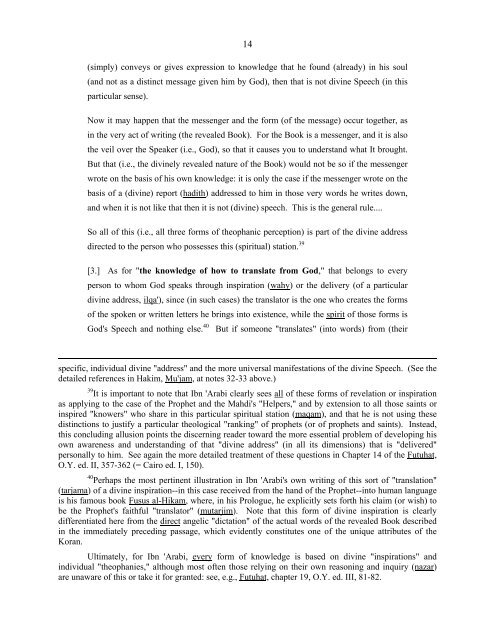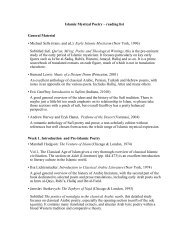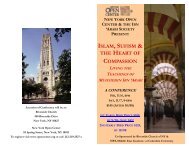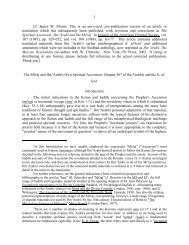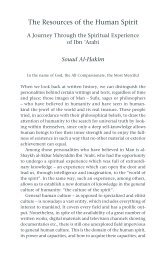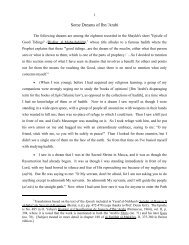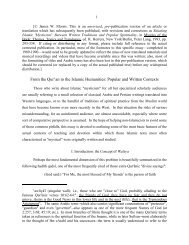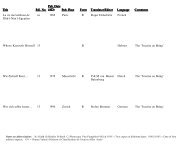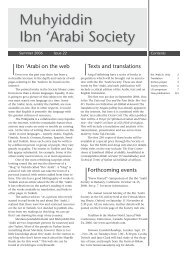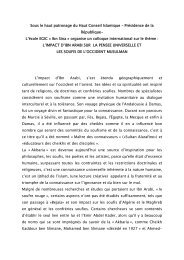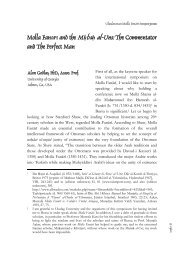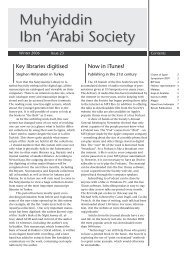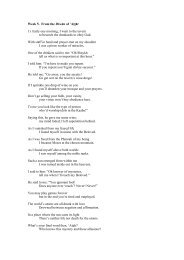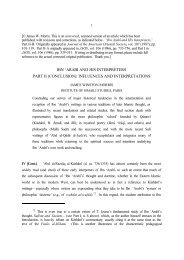The Mahdi and His Helpers - Muhyiddin Ibn Arabi Society
The Mahdi and His Helpers - Muhyiddin Ibn Arabi Society
The Mahdi and His Helpers - Muhyiddin Ibn Arabi Society
Create successful ePaper yourself
Turn your PDF publications into a flip-book with our unique Google optimized e-Paper software.
14(simply) conveys or gives expression to knowledge that he found (already) in his soul(<strong>and</strong> not as a distinct message given him by God), then that is not divine Speech (in thisparticular sense).Now it may happen that the messenger <strong>and</strong> the form (of the message) occur together, asin the very act of writing (the revealed Book). For the Book is a messenger, <strong>and</strong> it is alsothe veil over the Speaker (i.e., God), so that it causes you to underst<strong>and</strong> what It brought.But that (i.e., the divinely revealed nature of the Book) would not be so if the messengerwrote on the basis of his own knowledge: it is only the case if the messenger wrote on thebasis of a (divine) report (hadith) addressed to him in those very words he writes down,<strong>and</strong> when it is not like that then it is not (divine) speech. This is the general rule....So all of this (i.e., all three forms of theophanic perception) is part of the divine addressdirected to the person who possesses this (spiritual) station. 39[3.] As for "the knowledge of how to translate from God," that belongs to everyperson to whom God speaks through inspiration (wahy) or the delivery (of a particulardivine address, ilqa'), since (in such cases) the translator is the one who creates the formsof the spoken or written letters he brings into existence, while the spirit of those forms isGod's Speech <strong>and</strong> nothing else. 40 But if someone "translates" (into words) from (theirspecific, individual divine "address" <strong>and</strong> the more universal manifestations of the divine Speech. (See thedetailed references in Hakim, Mu'jam, at notes 32-33 above.)39 It is important to note that <strong>Ibn</strong> '<strong>Arabi</strong> clearly sees all of these forms of revelation or inspirationas applying to the case of the Prophet <strong>and</strong> the <strong>Mahdi</strong>'s "<strong>Helpers</strong>," <strong>and</strong> by extension to all those saints orinspired "knowers" who share in this particular spiritual station (maqam), <strong>and</strong> that he is not using thesedistinctions to justify a particular theological "ranking" of prophets (or of prophets <strong>and</strong> saints). Instead,this concluding allusion points the discerning reader toward the more essential problem of developing hisown awareness <strong>and</strong> underst<strong>and</strong>ing of that "divine address" (in all its dimensions) that is "delivered"personally to him. See again the more detailed treatment of these questions in Chapter 14 of the Futuhat,O.Y. ed. II, 357-362 (= Cairo ed. I, 150).40 Perhaps the most pertinent illustration in <strong>Ibn</strong> '<strong>Arabi</strong>'s own writing of this sort of "translation"(tarjama) of a divine inspiration--in this case received from the h<strong>and</strong> of the Prophet--into human languageis his famous book Fusus al-Hikam, where, in his Prologue, he explicitly sets forth his claim (or wish) tobe the Prophet's faithful "translator" (mutarjim). Note that this form of divine inspiration is clearlydifferentiated here from the direct angelic "dictation" of the actual words of the revealed Book describedin the immediately preceding passage, which evidently constitutes one of the unique attributes of theKoran.Ultimately, for <strong>Ibn</strong> '<strong>Arabi</strong>, every form of knowledge is based on divine "inspirations" <strong>and</strong>individual "theophanies," although most often those relying on their own reasoning <strong>and</strong> inquiry (nazar)are unaware of this or take it for granted: see, e.g., Futuhat, chapter 19, O.Y. ed. III, 81-82.


